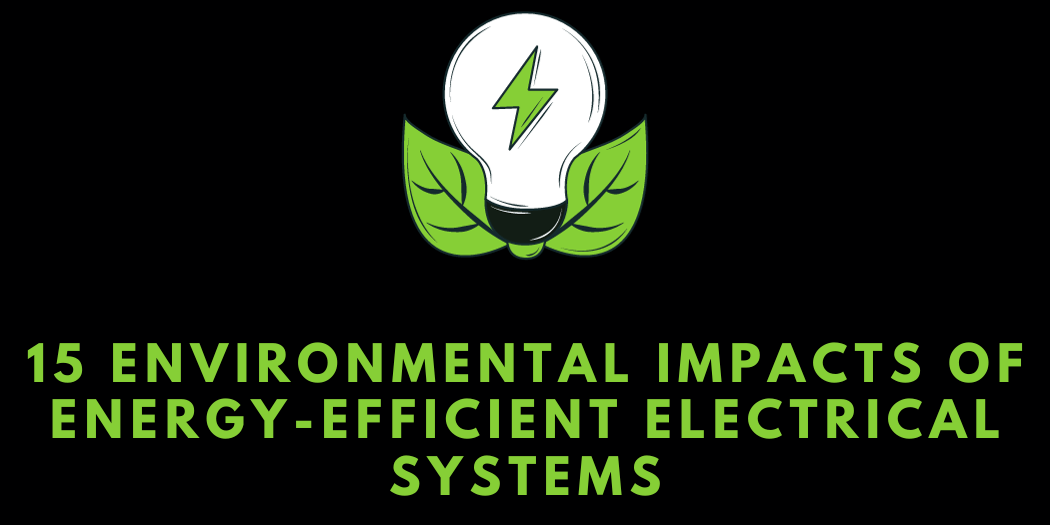15 Environmental Impacts of Energy-Efficient Electrical Systems
As our world faces pressing environmental challenges, the importance of energy efficiency cannot be overstated.
One area where significant strides have been made is in electrical systems. In this comprehensive guide, we will explore the environmental impact of energy-efficient electrical systems.
From reduced carbon emissions to the conservation of resources, these systems are playing a vital role in safeguarding our planet.
Environmental Impacts of Energy-Efficient Electrical Systems
Energy-efficient electrical systems represent a pivotal shift in the way we harness and consume energy.
These systems aim to minimize waste and reduce energy consumption, making them not only cost-effective but also environmentally friendly. In a world increasingly focused on sustainability and reducing carbon footprints, the environmental impact of energy-efficient electrical systems is a subject of utmost importance.
1. Reduction in Greenhouse Gas Emissions
One of the most significant environmental benefits of energy-efficient electrical systems is the reduction in greenhouse gas emissions.
Traditional electrical systems, often characterized by inefficiencies and wastage, contribute significantly to carbon emissions.
Energy-efficient systems, on the other hand, optimize energy usage, resulting in reduced emissions and a smaller ecological footprint.
2. Lower Energy Consumption
Energy-efficient electrical systems are designed to use less energy while maintaining or even improving performance. This reduction in energy consumption has a cascading effect on the environment:
- Resource Conservation: Lower energy use means reduced demand for fossil fuels, thus conserving valuable natural resources.
- Mitigation of Resource Depletion: As the world grapples with resource scarcity, efficient electrical systems play a role in slowing the depletion of non-renewable resources.
- Energy Generation Impact: By consuming less electricity, we reduce the need for power generation, often associated with environmental degradation and habitat destruction.
3. Decreased Air Pollution
Energy-efficient electrical systems lead to cleaner air by reducing the need for power plants that burn fossil fuels.
Such plants are a major source of air pollution, emitting harmful substances like sulfur dioxide, nitrogen oxides, and particulate matter.
In contrast, energy-efficient systems lower the demand for power generation, thereby mitigating these emissions.
4. Renewable Energy Integration
Energy-efficient systems often integrate seamlessly with renewable energy sources such as solar panels and wind turbines.
This synergy between efficiency and renewable energy maximizes the environmental benefits by reducing reliance on fossil fuels and lowering greenhouse gas emissions.
5. Extended Equipment Lifespan
Energy-efficient systems are designed to minimize wear and tear on electrical equipment. This results in:
- Fewer Manufacturing Needs: Energy-efficient systems need to be replaced less frequently, reducing the environmental impact of manufacturing and disposal of equipment.
- E-Waste Reduction: The longer lifespan of energy-efficient systems means less electronic waste, a significant contributor to environmental pollution and resource depletion.
6. Reduced Heat Generation
Traditional electrical systems often produce a substantial amount of waste heat, which contributes to increased cooling demands in buildings. Energy-efficient systems generate less heat, reducing the need for energy-intensive air conditioning systems and thereby conserving energy.
7. Demand Response Integration
Energy-efficient electrical systems can incorporate demand response capabilities. This means that they can adapt to fluctuating energy prices and availability.
During peak energy demand periods, these systems can automatically reduce energy consumption, helping to balance the energy grid and reduce the need for fossil fuel power plants.
8. Incentives for Sustainable Practices
Government agencies and utility companies often provide incentives for the adoption of energy-efficient electrical systems.
These incentives can include tax credits, rebates, and lower electricity rates, which encourage homeowners and businesses to invest in energy-efficient upgrades, further reducing environmental impact.
9. Efficient Lighting
Energy-efficient lighting, such as LED and CFL bulbs, represents a significant shift away from energy-draining incandescent lighting. Not only do these lights use less electricity, but they also have a longer lifespan, reducing the number of bulbs that end up in landfills.
10. Smart Home Integration
The rise of smart home technology has revolutionized energy management within households. Smart thermostats, lighting, and appliances enable homeowners to optimize energy use, reducing waste and energy bills. This level of control and automation contributes to a more sustainable lifestyle.
11. Reduced Water Consumption
While not a direct impact of electrical systems, it’s worth noting that energy-efficient electrical systems can indirectly contribute to water conservation.
Many traditional power generation methods, such as coal and natural gas, require substantial water for cooling.
By reducing the demand for these power sources, energy-efficient systems indirectly reduce water consumption in the energy sector.
12. Global Impact
The adoption of energy-efficient electrical systems is a global movement. Nations across the world are setting ambitious energy efficiency targets, and businesses are increasingly recognizing the economic and environmental advantages of going green. Collectively, this shift is reducing the environmental impact of electricity consumption on a global scale.
13. The Role of Government and Regulations
Government policies and regulations play a crucial role in advancing energy efficiency. These policies include setting energy efficiency standards, promoting research and development, and offering incentives to individuals and businesses to adopt energy-efficient technologies.
14. Challenges and Considerations
While the environmental benefits of energy-efficient electrical systems are clear, there are challenges and considerations to address:
- Upfront Costs: Energy-efficient systems may have higher initial costs, which can deter adoption for some individuals and businesses.
- Technology Evolution: The rapid pace of technological advancement can make it challenging to keep up with the latest energy-efficient solutions.
- Behavioral Change: Effective adoption of energy-efficient systems often requires changes in behavior and practices, which can be met with resistance.
15. Conclusion
The environmental impact of energy-efficient electrical systems cannot be overstated. From reducing greenhouse gas emissions and lowering energy consumption to minimizing air pollution and conserving resources, these systems are instrumental in mitigating the environmental challenges we face.
As technology continues to advance and our awareness of sustainability grows, energy efficiency will remain a cornerstone in our efforts to create a more sustainable and environmentally responsible future. It is crucial for individuals, businesses, and governments to continue prioritizing and investing in energy-efficient electrical systems to protect our planet for generations to come.







